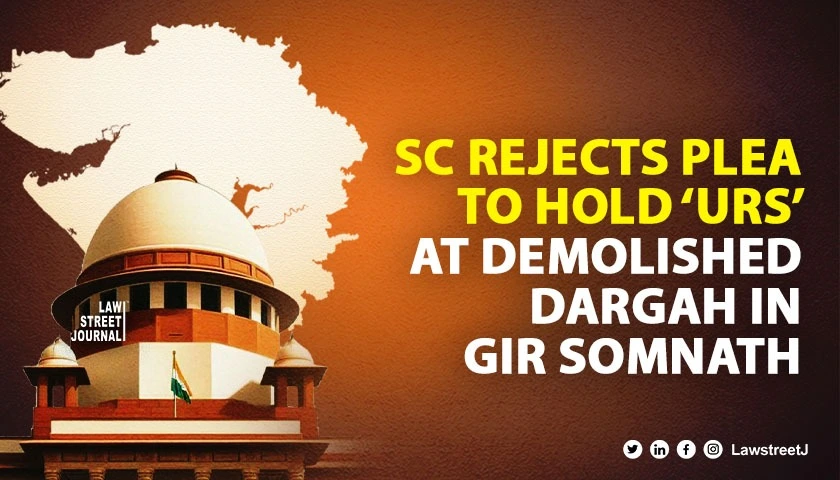NEW DELHI: The Supreme Court on Friday rejected a plea for permission to conduct 'Urs' festival from February 1-3, at a demolished dargah in Gir Somnath district, Gujarat.
SC Denies Permission for ‘Urs’ Festival at Demolished Dargah in Gir Somnath
A bench of Justices B R Gavai and Augustine George Masih declined to entertain the application, without considering the main matter.
Solicitor General Tushar Mehta, representing the Gujarat authorities submitted that no activities, including Hindu religious rituals, were being permitted on the land which was earlier under encroachment.
Supreme Court Upholds Ban on Religious Gatherings at Encroached Site in Gujarat
However, the counsel, appearing for the applicant, said there was a dargah, which was demolished by the authorities.
He said that the tradition of conducting the 'Urs' festival at the dargah has been going on for the past so many years. The counsel submitted that the authorities had on Thursday denied permission for it and requested the court to permit gatherings of at least 20 people.
He argued that there is a government notification that it is a protected monument, and pointed the structure was on the list of protected monuments.
The bench said the authorities have demolished two temples.
Referring to a response from the Department of Archaeology, Mehta contended that the department had said that prior to this demolition in 2023, they conducted a survey and the department did not find any archaeological monument and there are detailed proceedings, one year back.
“You should not permit any religious function, even Hindus,” the bench told Mehta, who replied that there is Somnath Trust and even this did not get permission from authorities.
The bench asked the applicant’s counsel, “In contempt plea, how are you seeking this relief?”
Mehta said in 1951, this land was allotted by Sardar Patel to Somnath Trust, and some passerby is filing a contempt and he is not the main petitioner, pending before the apex court.
“Across religion, whatever was unauthorised was demolished. In Phase I of the removal on October 8, 2023, 26 encroachments were removed, out of which one encroacher belonged to the Hindu community. In Phase II, January 27, 2024, 174 encroachments, including temples all belonging to members of the Hindu community were removed," he submitted.
He also submitted that in Phase III, on January 27 and January 28, 2024, 155 encroachments on public roads were removed from a village, out of which 147 encroachments belonged to members of the Hindu community and 8 encroachments belonged to the Muslim community.
“In Phase IV, 40 encroachments, all belonging to the members of the Hindu community were removed…..Phase V cleared 102 acres of government land of encroachments,” he said.
He said that the contempt was filed against the backdrop of the court’s order that demolition should not occur without procedure, but the court had made it clear that any encroachment on public place or government land cannot be shielded.
“This indisputably is government land," he said.
He pointed out, they moved a contempt plea before the courts, lower court and the high court, which was rejected.















